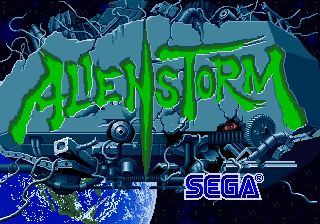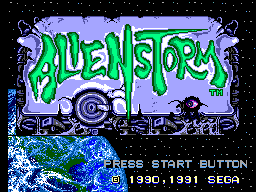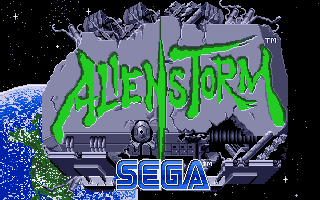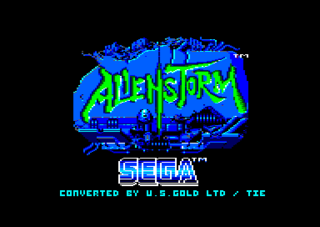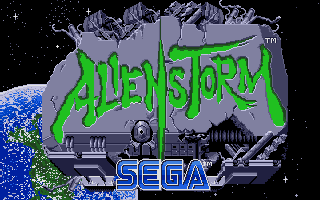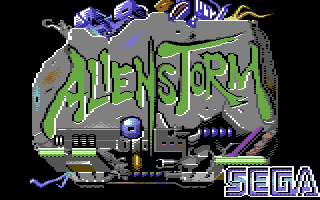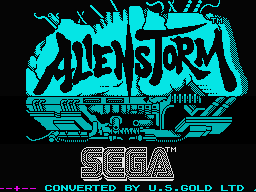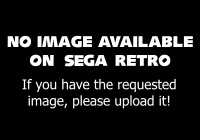- For the Sega Mega Drive game, see Alien Storm (Mega Drive).
Alien Storm (エイリアンストーム) is a 1990 beat 'em up game released by Sega for Sega System 18 hardware (supposedly the second game for that platform).
Story
When aliens invade earth, it's up to a special forces team known as the "Alien Busters," to get rid of them.
Gameplay
Alien Storm is very similar in nature to Sega's earlier title, Golden Axe, though sports a futuristic setting and occasional bonus rounds, and the pace of play is much faster.
Playable characters
Alien Storm has three playable characters, however for unknown reasons their appearance and names differ between ports and regional variants of the game.
|
|
Gordon/Garth (ゴードン)
|
| Cook of the Alien Burger when not killing xenos. Uses a lightning gun (or an oversized taser) as a main weapon. Also uses a rocket launchers (which he hilariously fires point blank range) and a machine pistol. Also punches or stomps on aliens as attack animations. In the Master System version he uses what manual calls a "Fire Blazer", a flamethrower. His special weapon is a futuristic US Air Force fighter which strafes the screen with energy weapons. (In the Master System version he uses Karla's special weapon.)
|
|
|
Karla/Karen (カーラ)
|
| Karla is missing from the Master System version. Karla takes orders in Alien Burger van. She uses a flamethrower as her main weapon. She also uses a heavy caliber pistol as a part of her attack animation. Her special weapon is a ballistic missile. (Which for some reason does not obliterate the city they are in.)
|
|
|
Scooter (スクーター) / Slammer
|
| The overseas Master System versions of the game rename this character "Slammer". Scooter acts as the waiter of the Alien Burgers. He (It?) uses an energy whip as a main weapon. His other weapons include: ankle machineguns, wrist guns and very short range back mortar. In his special attack he self-destructs while leaving only his head. A replacement body runs along and grabs the head, re-attaching it to his body. (Majority of the Alien Hunters' budget must be spent on Scooter's replacement frames.)
|
Missions
|
|
Mission 1
|
|
|
|
|
Mission 2
|
|
|
|
|
Mission 3
|
|
|
|
|
Mission 4
|
|
|
|
|
Mission 5
|
|
|
|
|
Mission 6
|
|
|
History
Legacy
Alien Storm was ported to a variety of platforms, including the Amiga, Amstrad CPC, Atari ST, Commodore 64, Sega Master System and ZX Spectrum, most of which being released in 1991.
Versions
Master System version
On the Master System, Alien Storm is a one-player only game.
Commodore 64 version
The Commodore 64 version was produced by Tiertex, and like other home ports of the game, only allows two players on screen at any given time (and to save on memory, both players control the same character). Introduction sequences were cut to save space, while some sections of the game were altered to reduce the impact of multi-loading (i.e. having to load data from the cassette mid-play)[10].
Tiertex used Atari STs to program the C64 game[10], but relied on Amiga computers for the graphics. For the Commodore 64 version, all sprites were re-drawn by hand, using ripped sprites from the arcade board as guidelines[10], while the backgrounds were converted through a bespoke Amiga program[10].
Music was composed on a synthesizer, imported to an Atari ST with help from the system's built-in MIDI ports, and then adjusted for use with the Commodore 64[10].
Amstrad CPC and ZX Spectrum versions
The Amstrad and Spectrum versions, also produced by Tiertex, are largely the same game, however the Spectrum is played in monochrome with higher resolution graphics. Neither feature in-game music.
Production credits
- Main article: Alien Storm/Production credits.
Magazine articles
- Main article: Alien Storm/Magazine articles.
Promotional material
- Main article: Alien Storm/Promotional material.
Physical scans
System 18 version
| {{{{{icon}}}|L}}
|
Division by zero.
|
Based on
0 review
|
| System 18, US
|
|
|
 Manual |
| System 18, JP
|
 "Long" instructions |
  Instuction card(s) |
Master System version
| {{{{{icon}}}|L}}
|
Division by zero.
|
Based on
0 review
|
| Master System, EU
|
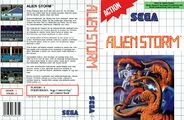 Cover
|
 Cart |
| Master System, PT
|
 Cover
|
|
|
| Master System, BX†
|
 Cover
|
 Cart |
| Master System, TR
|
|
|
 Cart |
| Master System, AU
|
 Cover
|
 Cart |
| Master System, AU (Wide sticker)
|
 Cover
|
 Cart |
| Master System, BR
|
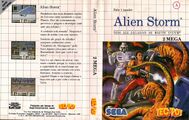 Cover
|
 Cart  Manual |
| Master System, KR
|
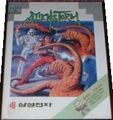 Cover
|
 Cart |
| Master System, MX
|
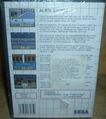 Cover
|
 Cart |
Amiga version
| {{{{{icon}}}|L}}
|
Division by zero.
|
Based on
0 review
|
| Amiga, ES
|
|
|
 Disk |
Amstrad CPC version
| {{{{{icon}}}|L}}
|
Division by zero.
|
Based on
0 review
|
| Amstrad CPC, UK (cassette)
|
|
|
|
|
| Amstrad CPC, ES (cassette)
|
 Cover
|
 Cassette |
| Amstrad CPC, ES (disk)
|
 Cover
|
|
|
Atari ST version
| {{{{{icon}}}|L}}
|
Division by zero.
|
Based on
0 review
|
| Atari ST, UK
|
|
|
 Disk |
Commodore 64 version
| {{{{{icon}}}|L}}
|
Division by zero.
|
Based on
0 review
|
| Commodore 64, UK
|
|
|
 Cassette |
ZX Spectrum version
| {{{{{icon}}}|L}}
|
Division by zero.
|
Based on
0 review
|
Technical information
ROM dump status
| System |
Hash |
Size |
Build Date |
Source |
Comments |
|
|
|
| ?
|
| CRC32
|
7f30f793
|
| MD5
|
c60380642a89805f569124a875248d71
|
| SHA-1
|
aece64ecbfbe08b199b29df9bc75743773ea3d34
|
|
256kB
|
|
Cartridge (EU)
|
|
|
|
|
References
- ↑ Credited in the in-game ending
- ↑ File:AStorm ms eu cover.jpg
- ↑ Sega Arcade History, Enterbrain, page 103
- ↑ 4.0 4.1 4.2 4.3 4.4 4.5 Computer & Video Games, "July 1991" (UK; 1991-06-15), page 16
- ↑ 5.0 5.1 5.2 Crash, "October 1991" (UK; 1991-09-xx), page 56
- ↑ Sega Pro, "November 1991" (UK; 1991-xx-xx), page 9
- ↑ 7.0 7.1 Computer & Video Games, "November 1991" (UK; 1991-10-15), page 83
- ↑ 8.0 8.1 Computer & Video Games, "February 1992" (UK; 1992-01-15), page 20
- ↑ Supergame, "Fevereiro 1992" (BR; 1992-02-xx), page 28
- ↑ 10.0 10.1 10.2 10.3 10.4 Zzap!64, "July 1991" (UK; 1991-06-13), page 29
- ↑ Computer & Video Games, "September 1990" (UK; 1990-08-16), page 66
- ↑ Svet Kompjutera, "Jun 1992" (YU; 1992-xx-xx), page 64
- ↑ User, "Septémvrios 1991" (GR; 1991-0x-xx), page 94
- ↑ Aktueller Software Markt, "Februar 1992" (DE; 1992-01-10), page 129
- ↑ Consoles +, "Février 1992" (FR; 1992-0x-xx), page 110
- ↑ Console XS, "June/July 1992" (UK; 1992-04-23), page 137
- ↑ Mean Machines: The Essential Sega Guide, "" (UK; 1993-11-18), page 127
- ↑ Game Zone, "March 1992" (UK; 1992-02-21), page 38
- ↑ Hobby Consolas, "Abril 1992" (ES; 1992-0x-xx), page 100
- ↑ Joypad, "Janvier 1992" (FR; 1991-12-1x), page 44
- ↑ Joystick, "Janvier 1992" (FR; 199x-xx-xx), page 135
- ↑ Mega Force, "Septembre/Octobre 1991" (FR; 1991-09-13), page 89
- ↑ Mean Machines, "February 1992" (UK; 1992-01-27), page 104
- ↑ Mean Machines Sega, "October 1992" (UK; 1992-09-xx), page 132
- ↑ Player One, "Janvier 1992" (FR; 199x-xx-xx), page 93
- ↑ Sega Power, "March 1992" (UK; 1992-02-06), page 48
- ↑ Sega Pro, "March 1992" (UK; 1992-02-20), page 34
- ↑ Sega Pro, "November 1992" (UK; 1992-10-08), page 25
- ↑ Sega Pro, "April 1993" (UK; 1993-03-11), page 70
- ↑ Sega Force, "Februrary 1992" (UK; 1992-01-23), page 72
- ↑ Video Games, "4/91" (DE; 1991-12-06), page 40
- ↑ Amiga Joker, "November 1991" (DE; 1991-10-31), page 45
- ↑ Amiga Power, "January 1992" (UK; 1991-12-19), page 97
- ↑ Games-X, "29th August-4th September 1991" (UK; 1991-08-29), page 22
- ↑ 35.0 35.1 Génération 4, "Janvier 1992" (FR; 199x-xx-xx), page 108
- ↑ Joystick, "Décembre 1991" (FR; 1991-1x-xx), page 242
- ↑ Micromanía (segunda época), "Diciembre 1991" (ES; 1991-1x-xx), page 26
- ↑ Power Play, "12/91" (DE; 1991-11-13), page 133
- ↑ User, "Aprílios 1992" (GR; 1992-0x-xx), page 46
- ↑ Joystick, "Octobre 1991" (FR; 1991-xx-xx), page 204
- ↑ Commodore Format, "October 1991" (UK; 1991-09-19), page 36
- ↑ Your Sinclair, "October 1991" (UK; 1991-09-05), page 54
